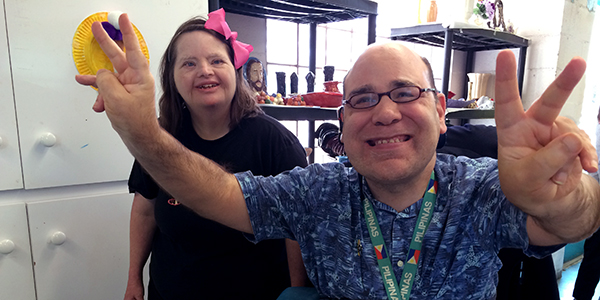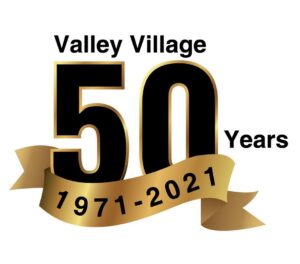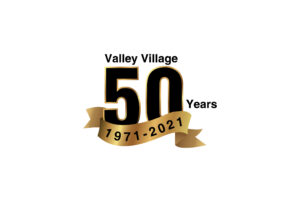
 Valley Village has been a community leader in the San Fernando Valley for 50 years, providing programs and services that help adults with developmental and intellectual disabilities live independently as possible. A 501(c)3 organization, Valley Village was founded in 1971 by a group of concerned parents who had the vision to establish opportunities for their children with developmental disabilities. They wanted their children to thrive in accepting, stimulating, and engaging environments. They worked to launch the San Fernando Valley’s first public schools for the developmentally challenged. They established Valley Village, a nonprofit organization to care for their children in an uncertain future.
Valley Village has been a community leader in the San Fernando Valley for 50 years, providing programs and services that help adults with developmental and intellectual disabilities live independently as possible. A 501(c)3 organization, Valley Village was founded in 1971 by a group of concerned parents who had the vision to establish opportunities for their children with developmental disabilities. They wanted their children to thrive in accepting, stimulating, and engaging environments. They worked to launch the San Fernando Valley’s first public schools for the developmentally challenged. They established Valley Village, a nonprofit organization to care for their children in an uncertain future.
In the late 1960s and early 1970s, a new era was dawning for the people with developmental challenges. New attitudes and new laws would take those with disabilities out of institutions and place them in the community, more in the mainstream. As parents, we were excited about the better lives now promised to our intellectually challenged children. We saw the new system as an opportunity and as a responsibility to create the very best lives possible for our children. We were active in helping to establish the San Fernando Valley’s first public schools for the developmentally challenged – West Valley School, East Valley School, and Diane Leichman High School. After these schools opened in 1970 and 1971, we turned our attention to our children’s future.
Concerned about their opportunities and care as adults and their long-term living arrangements, we had a vision for our children’s future. In 1971, we formed a nonprofit organization, originally named The Valley Parent Group for the Trainable Mentally Retarded, to advance the rights and interests of people with developmental disabilities. From then on, it was full speed ahead for us. We learned about grants, foundations, licensing, building codes, and state, city, and county regulations. We attended community meetings.
Here is an interview from December 2013, with two of Valley Village’s founding parents, Dolores Zimmermann and June Stanton. June and Dolores talk about their experiences as parents of children with special needs and creating Valley Village from the ground up at a time when the only options for their children were institutions.
As parents, we constantly worried about what would happen to our adult children when we could no longer care for them. We wanted to provide for their permanent care. We had envisioned a village on a single site, but the experts wouldn’t endorse that approach because it didn’t involve the residents enough in the broader community. So we took the mainstream route and, circa 1976, a dream came true as we opened our first home for adults with developmental disabilities. The residence in Sylmar housed six young women. We called the home Valley Village. The parents actually had to shovel out debris from the building that they spruced up and furnished. June Stanton made the curtains and bedspreads for the six women. We had a grant promised, but we had to get the home ready with furniture, kitchen utensils, and all before the home could be inspected and approved.
In October 1976, our Thrift Shop opened at 7329 Reseda Blvd., the first of several locations for the store over the years. Volunteers would put in countless hours collecting donated items and staffing the store. The revenue from the Thrift Shop was vital then. It was often needed to fund equipment or payroll for our service programs.
Our annual Steak Fry was an early fundraiser that raised money for Valley Village group homes. The event began as a backyard potluck and grew to include a fashion show with volunteers modeling clothes from the Thrift Shop. It has since grown and evolved into other events that help support the financial needs of Valley Village programs.
Our next home, for young men, opened about a year after the home for women. Altogether in the late ’70s and early ’80s, we opened five more homes. Later in the ’80s, we began our afterschool programs as well as opening our first Adult Development Center. Harking back to our beginnings, we changed our name to Valley Village in 1987.
The 1990s brought many changes. From 1990 to 1993, we continued to buy and renovate homes. Over the years, we have added new homes for a total of 15 family-style homes throughout the San Fernando Valley. In 1993, we opened the condos for our semi-independent living program. In 1994, we opened a 12-bed nursing facility to provide the extra care needed by our clients with health conditions.
In 1995, we purchased Valley Village Center in Winnetka, with the first floor devoted to the Adult Development Center, and with administration and the nursing staff for the residential program on the second floor. The adult development program here is divided into three components: the core adult development center, a program for behavior management, and another for medically fragile clients. In the early 2000s, Valley Village House, a continuous-care nursing home, opened to care for our medically fragile clients. The Sunland Adult Day Center also opened.
In the early 2000s, Valley Village House, a continuous nursing home, opened to care for our medically fragile clients. The Sunland Adult Day Center also opened. In the early part of the decade, the Thrift Shop closed after many years of various locations. Records show that it earned over $1 million thanks to the dedication and loyalty of volunteers. It had kept us going through lean times.
In 2001, we purchased the McDonald’s restaurant property next door to our Winnetka administration building. We converted the building, and we were able to expand our day program and open our after-school program. In 2002, the Valley Village Foundation was established to act as a supporting foundation for Valley Village to ensure its long-term viability and fiscal stability.
We entered the second decade of the 21st Century in a recession, with unemployment high, foreclosures rampant, and belt-tightening our new mode of life in government, business, and personally. But our clients are still smiling.
While much has changed in the past four decades, for our clients, much remains the same. They still need continuous care, and they and their families depend on us to provide a safe, nurturing environment. Many of our clients have grown older and have much greater needs for care, and our funding gets tighter. Through the decades, the commitment of our staff and our generous supporters stays strong, keeping Valley Village the place where people with developmental challenges thrive.
In 2011, we celebrated our 40th anniversary. Our commitment is stronger than ever. We serve some 400 clients in our residential and day programs. We have two Adult Development Centers and an Adult Day Health Center. We are a model program for services for adults with developmental challenges. Our level of in-depth medical services makes us the only program in the San Fernando Valley where developmentally challenged adults with medical problems can attend day programs. Our homes are cheerful and are residents well cared for. They feel safe and they have fun.
In 2013, we opened our Larkspur Home. Larkspur is our newest nursing home to care for medically fragile individuals coming out of the state developmental centers that are now being closed.
Valley Village currently operates 17 residential homes and a semi-independent living program for clients who can benefit from a less restrictive setting. Many of our residents have stayed for years, and they are no longer young. Our population and their needs are changing. Valley Village’s staff and continuum of care will continue to serve our clients throughout all stages of their lives.
We actively seek new funding opportunities and partnerships that support our mission and help us to provide safe and enriching programs for our clients.
 2021 marks Valley Village’s 50th year of service for people with special needs. Despite our success, we cannot rest on our laurels. We continue to support our mission, advocating for the rights and interests of our clients with our legislators. At the same time, we are pursuing new funding to provide staff with the necessary resources to give the best care possible for our clients.
2021 marks Valley Village’s 50th year of service for people with special needs. Despite our success, we cannot rest on our laurels. We continue to support our mission, advocating for the rights and interests of our clients with our legislators. At the same time, we are pursuing new funding to provide staff with the necessary resources to give the best care possible for our clients.
Thank you to our volunteers, supporters, staff, and the business community for 50 years of hard work and generosity.